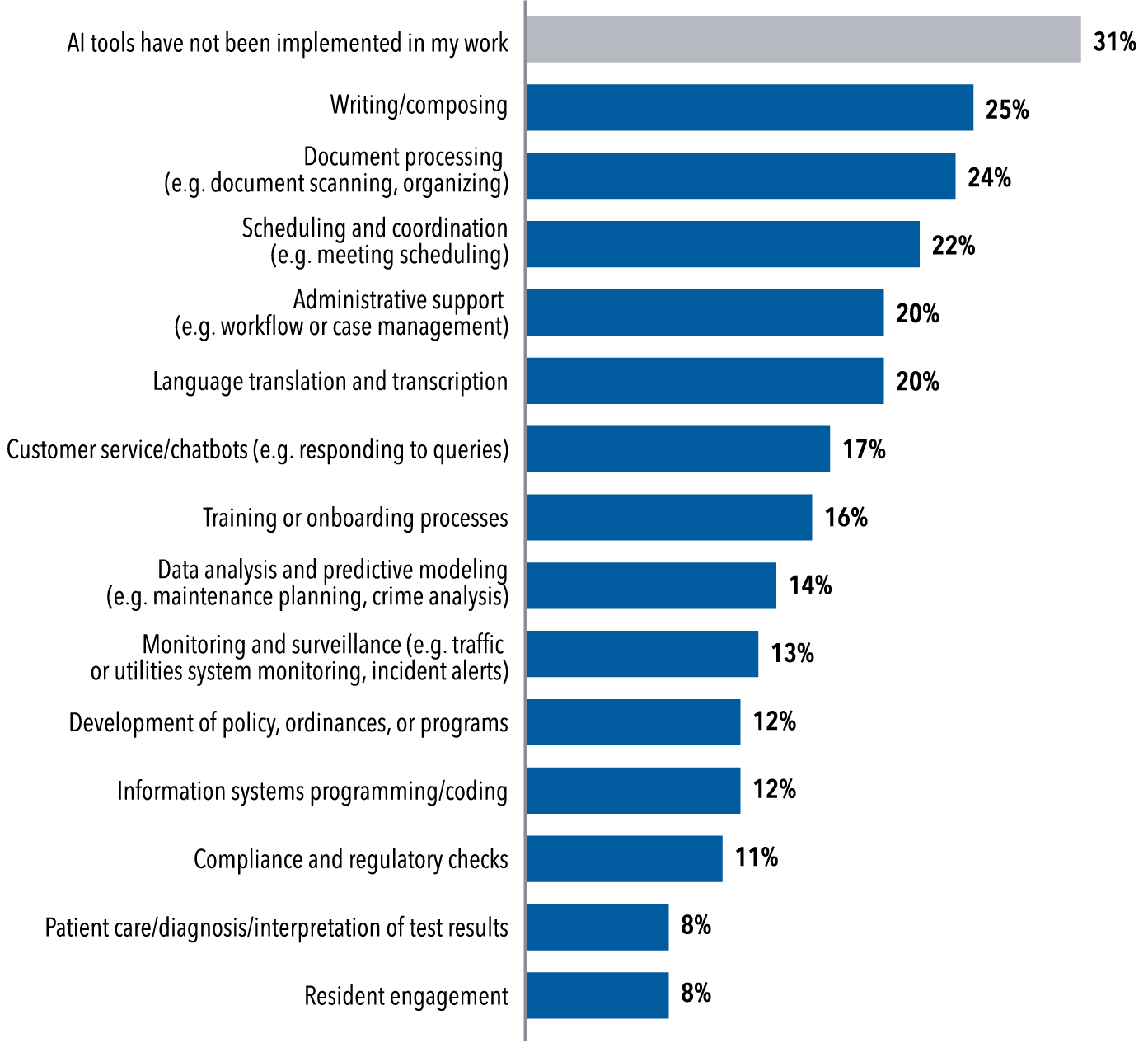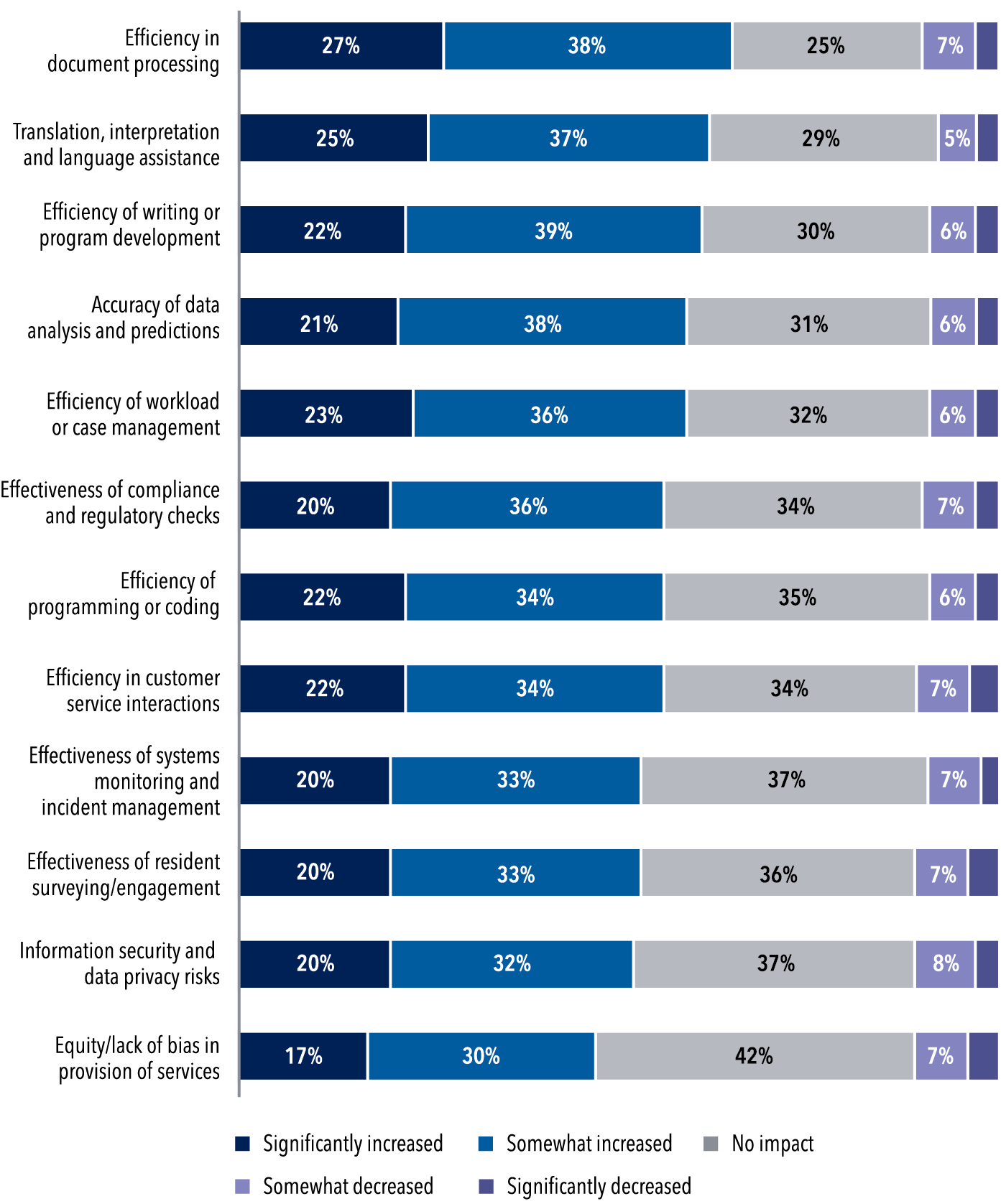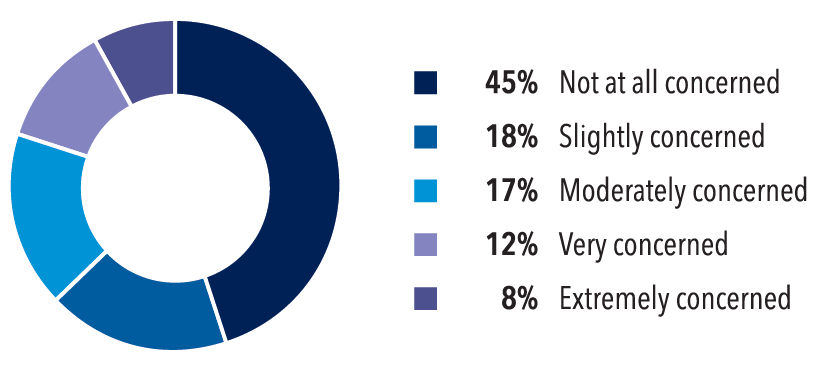
Sponsored content powered by ICMA strategic partner, MissionSquare Research Institute.
Assessments of the impact of artificial intelligence on state and local government tend to focus on use cases and the predicted or actual results in terms of efficiency, effectiveness, or customer service.
MissionSquare Research Institute has instead focused on the public sector employees—how they are using AI, what services they provide, and what concerns they may have about how their roles may change or whether their positions may even be eliminated.
From a survey of 2,000 state and local government employees, the institute found:
46% of respondents say they are currently using AI tools in their work, but only 17% use them on a daily basis.
More than half report improved work quality and productivity, while more than 60% report the community being satisfied with how those AI tools have impacted them.
42% feel they are more knowledgeable about their workplace use of AI than their co-workers.
Technology applications have impacts beyond their quantitative results. In the workforce, such tools are often intended to increase efficiency and productivity, enhance record keeping and accountability, or even to enable the data analysis that will guide further process improvement. However, all of those changes also impact the employees who work with that technology. At a minimum, that may require user training and the restructuring of workflows and communications. When technology changes the very nature of the work, organizations also may need to review their job descriptions, education and experience requirements, ergonomic standards, and even the number and types of budgeted positions.
The most common uses of AI are in report research and writing, document processing, meeting scheduling, or language translation. Other use cases include data analysis, predictive modeling, and customer service engagement (e.g., interactive voice response, chatbots, and translation services).

About 35% report using AI software that is commercially available online, with another 35% using applications custom-developed for their organization.
Many respondents said they use AI tools on their own volition, but for 34% of respondents, the use of certain AI applications is mandated by their employer.
Where AI tools have been applied, most of those offering an assessment said that its impact has been positive. The most common result was an increase in document processing efficiency, with positive results (65%) far outweighing negative experience (10%).

NOTE: Totals do not sum to 100% due to rounding. In most cases, an increase in these metrics is a positive. Regarding information security and data privacy risks, an increase would be a negative outcome.
More broadly:
13% view the quality of their team’s services as having increased significantly,
17% also view their own daily productivity to have experienced a very positive impact.
Among the areas that appear to be lagging so far are training and preparation:
62% of staff have not received training on the use of AI tools from their employer.
41% view their employers as slightly or not at all prepared for AI implementation.
28% say AI-generated content is rarely or never reviewed by staff.
As for the more existential concerns that AI will result in a major restructuring of the workforce or the nature of their work, 58% are either only slightly or not at all concerned that they will be required to undertake significant retraining due to AI’s impact on their job function. At the other end of the spectrum, 20% are very or extremely concerned about this.

NOTE: Total does not sum to 100% due to rounding.
Relatedly, most employees are only slightly or not at all concerned about AI replacing their job function (63%; see Figure 4). Again, 20% are very or extremely concerned.

As jurisdictions consider how new AI tools can help streamline or improve customer service, data analysis, report writing or other tasks, considering employee training needs, policy oversight, and long-term employment concerns will be an important part of maintaining morale and engagement.
To read more about employees’ experiences with and concerns about AI, download the full report at Artificial Intelligence in the Workforce.
Local Government Reimagined Conference - The AI Edge: Orlando, FL | April 8-10, 2026
What's actually working with AI in cities and counties like yours? Hear from practitioners navigating the pitfalls, finding the wins, and separating hype from reality.
Session Spotlights:
- Navigating the Ethics and Politics of Municipal AI: A Practitioner Roundtable
- Bridging Silos: How We Can Use AI to Unlock Smarter, Safer, and Healthier Communities
- Mobile Workshop: The Institute for Simulation and Training at the University of Central Florida. Learn More
Early Bird Ends February 23 – Save $100-$200
VIEW ORLANDO SCHEDULE | REGISTER FOR ORLANDO
New, Reduced Membership Dues
A new, reduced dues rate is available for CAOs/ACAOs, along with additional discounts for those in smaller communities, has been implemented. Learn more and be sure to join or renew today!
